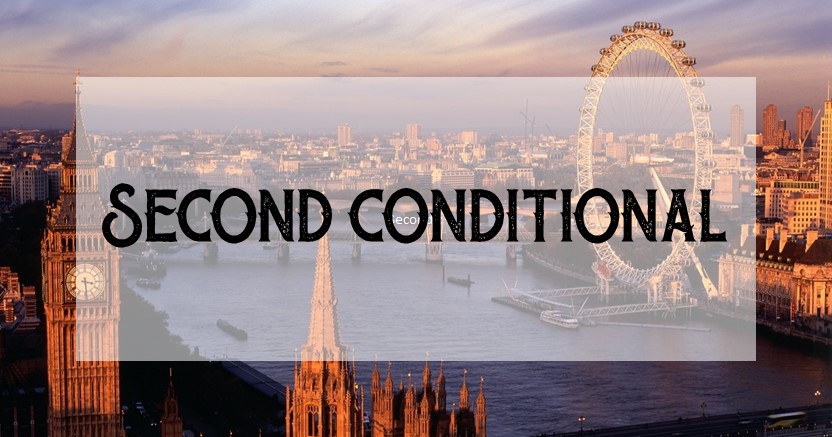The second conditional is one of the four main forms of conditionals in English. Conditionals are verb tenses that allow us to speculate, hypothesize or imagine what the situation would be like with other conditions.
In this post we will learn the second conditional at level II, so the explanations are in English and the examples shown have an intermediate difficulty.
Uses of the second conditional
We use the second conditional for:
1. Expressing hypothetical, imaginary or unreal situations in the future.
- If I won the lottery tomorrow, I'd buy a castle in England.
- If we didn't have to work today, we would go to the beach to swim.
- If Oliver had more free time, he would learn to paint with watercolors.
- If William had many cats at home, he would be very happy.
2. Giving advice.
- If I were you, I'd finish my homework this afternoon.
- If you wanted to learn to swim, you would go to swimming lessons.
- If you paid attention to me, you'd know what to do.
- If I was in your situation, I would have called my mother.
Structure of the second conditional
Affirmative sentences
If + past simple + , + would + infinitive
- If Sam had a million euros, he would donate it to an NGO.
- If I lived in Greece, every summer I would visit a Greek island.
- If my boyfriend studied at Hogwarts, he would be in Ravenclaw.
- If I were an intelligent alien, I wouldn't visit Earth.
It’s also possible to use the same structure but inverting both clauses and eliminating the comma:
Would + infinitive + if + past simple
- Sam would donate a million euros to an NGO if he had them.
- Every summer I would visit a Greek island if I lived in Greece.
- My boyfriend would be in Ravenclaw if he studied at Hogwarts.
- I wouldn't visit Earth if I were an intelligent alien.
Note: We usually use the contraction ’d instead of would when using an informal register.
- If you studied, you’d pass the exam. = If you studied, you would pass the exam.
- I’d ask for an autograph if I met a famous person. = I would ask for an autograph if I met a famous person.
Negative sentences
If + past simple + , + would not + infinitive
- If I were a millionaire, I would not live in this city.
- If you practiced enough, you would have no problem playing the trumpet.
- If we invited Jane to the party, she wouldn't come with her sister.
- If the temperature wasn't so high, we wouldn't be so hot.
As in affirmative sentences, you can use the same structure but inverting both clauses:
Would not + infinitive + if + past simple
- I would not live in this city if I were a millionaire.
- You would have no problem playing the trumpet if you practiced enough.
- Jane wouldn't come with her sister if we invited her to the party.
- We wouldn't be so hot if the temperature wasn't so high.
Note: We usually use the contraction wouldn’t instead of would not when using an informal register.
- If you had listened to me, we wouldn't be here. = If you had listened to me, we would not be here.
- It wouldn't be winter if we were in the other hemisphere. = It would not be winter if we were in the other hemisphere.
Interrogative sentences
If + past simple + , + would + subject + infinitive + ?
- If the world ended tomorrow, would you do something special today?
- If you met a magical genie, would you ask him for a wish?
- If we could travel for free, would we go to a distant country?
- If you were to marry your current partner, would you be excited?
You can also invert both clauses in interrogative sentences without changing the meaning.
Would + subject + infinitive + if + past simple + ?
- Would you do something special today if the world ended tomorrow?
- Would you ask him for a wish if you met a magical genie?
- Would we go to a distant country if we could travel for free?
- Would you be excited if you were to marry your current partner?


No hay comentarios:
Publicar un comentario